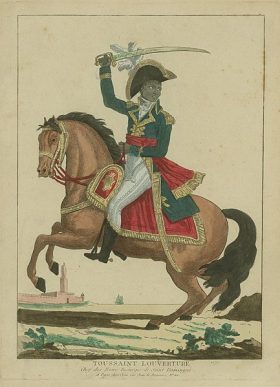PART 1: THE EARLY UNITED STATES
A slave revolt in Haiti saved the United States. How did it happen? Largely through the efforts of one man: Toussaint L'Ouverture.No longer a slave himself, Toussaint nonetheless trained and led the half million African slaves of Haiti to victory after victory, over England and France, for more than a decade. In the process, he kept America free from European domination.
In 1791, the new country of the United States of America was just getting on its feet. George Washington would run for re-election that year, and the two great political parties (Federalist and Democratic-Republican) were angling to get their men into top positions in government yet again. The western borders of the country were ever expanding, as was the number of states admitted into the Union.
Bad for the fledgling country, though, was the presence of European troops all around:
- English troops were still in Canada, stirring up trouble.
- French troops were in Haiti and in Mexico.
- Spanish troops were in South America and Central America.
The potential for European involvement in American affairs was high. President Washington and other government officials met with European officials time and again, trying to keep the peace and keep Americans out of European wars. But the more America refused to fight, the more both sides came to hate America.
Europeans had been bringing African slaves to America and the surrounding area since 1619. By 1791, the slavery system was so ingrained in the lifestyles of both Europeans and Africans that it seemed like it could go on indefinitely. At least that's what the Europeans thought.
The Africans saw it differently. And in 1791, they rose up in defiance of their captors. The place was Saint Dominigue (Haiti), a small Caribbean island then owned by France. This was France's wealthiest colony, and that wealth came almost exclusively from the plantations that were worked by African slaves.
PART 2: THE HAITIAN REVOLT
The slaves set fire to the plantations they worked in and demanded their freedom. With crops burning to a crisp as a backdrop, the slaves offered to fight for their right to freedom. Leading them was Toussaint L'Ouverture, himself a former slave. He was so successful at training and leading the 500,000 slaves (10 times the number of plantation owners) that even though it took a long time, they eventually conquered all of Haiti and all of Santo Domingo, the other half of the island. In 1801, L'Ouverture proclaimed himself governor-general of the entire island. He also outlawed slavery on the island.This didn't sit well with Napoleon, Emperor of France. The French didn't like losing Haiti, their wealthiest colony; and they certainly didn't like losing their colony to a rebel leader and a bunch of slaves. So Napoleon set a trap for L'Ouverture; sadly, the Haitian hero fell for it and was thrown into prison, where he died in 1803.
In that same year, French armies sailed to Haiti and tried to reinstate slavery, with French masters in charge, as before. Jean-Jacques Dessalines, one of Toussaint's generals and a former slave, led the Haitian forces to victory. It was a great day for Haiti and a great day for Africans everywhere.
On January 1, 1804, Dessalines declared the creation of the Republic of Haiti. This was the first black republic anywhere in the world.
PART 3: THE HAITIAN LEGACY
So how did all this affect the United States? Well, 1803 is the year that the U.S. and France agreed on the Louisiana Purchase. While all of the Haitian struggles were taking place, France was also fighting against England and other European powers in the Napoleonic Wars.Napoleon dreamed of a widespread French Empire. This included Haiti and other territories in North America, including Louisiana. He had even, at one time, considered attacking the United States itself.
But by 1803, with the European wars not going the way he had hoped, he needed money. So when American representatives came calling, he agreed to give up Louisiana (all of it) for a big chunk of money
The loss of Haiti contributed to the protection of America in three ways:
- It convinced Napoleon to abandon his dream of an American Empire.
- It made him desperate for money, making him sell the Louisiana Territory and abandon all claims to it (and any future plans of invading America).
- It gave hope to enemies of France everywhere. For a certain time, at the beginning of the Napoleonic Wars, France's Grand Army of the Republic seemed unbeatable. But England and other countries slowly turned the tide. The seemingly small victory of a half million slaves over the feared French soldiers in Haiti was an example of just how vulnerable French power really was to a determined, spirited freedom fighting force.
Without either Louisiana or Haiti as a jumping-off point, France would never again have the opportunity to attack the United States. And for this, America has to thank Toussaint L'Ouverture and his determined fellow rebels, many of whom gave their lives in the name of freedom. Many former slaves lived to see their dream come true. Partly because of their efforts, many Americans did, too.





